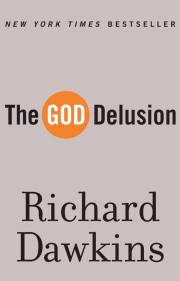 With rigor and wit, Dawkins examines God in all his forms, from the sex-obsessed tyrant of the Old Testament to the more benign (but still illogical) Celestial Watchmaker favored by some Enlightenment thinkers. He eviscerates the major arguments for religion and demonstrates the supreme improbability of a supreme being. He shows how religion fuels war, foments bigotry, and abuses children, buttressing his points with historical and contemporary evidence. The God Delusion makes a compelling case that belief in God is not just wrong but potentially deadly. It also offers exhilarating insight into the advantages of atheism to the individual and society, not the least of which is a clearer, truer appreciation of the universe’s wonders than any faith could ever muster.
With rigor and wit, Dawkins examines God in all his forms, from the sex-obsessed tyrant of the Old Testament to the more benign (but still illogical) Celestial Watchmaker favored by some Enlightenment thinkers. He eviscerates the major arguments for religion and demonstrates the supreme improbability of a supreme being. He shows how religion fuels war, foments bigotry, and abuses children, buttressing his points with historical and contemporary evidence. The God Delusion makes a compelling case that belief in God is not just wrong but potentially deadly. It also offers exhilarating insight into the advantages of atheism to the individual and society, not the least of which is a clearer, truer appreciation of the universe’s wonders than any faith could ever muster.
EDITORIAL REVIEWS
FROM PUBLISHERS WEEKLY
Copyright ┬® Reed Business Information, a division of Reed Elsevier Inc. All rights reserved.
FROM SCIENTIFIC AMERICAN
Richard Dawkins, in The God Delusion, tells of his exasperation with colleagues who try to play both sides of the street: looking to science for justification of their religious convictions while evading the most difficult implicationsÔÇöthe existence of a prime mover sophisticated enough to create and run the universe, “to say nothing of mind reading millions of humans simultaneously.” Such an entity, he argues, would have to be extremely complex, raising the question of how it came into existence, how it communicates ÔÇöthrough spiritons!ÔÇöand where it resides. Dawkins is frequently dismissed as a bully, but he is only putting theological doctrines to the same kind of scrutiny that any scientific theory must withstand. No one who has witnessed the merciless dissection of a new paper in physics would describe the atmosphere as overly polite.
